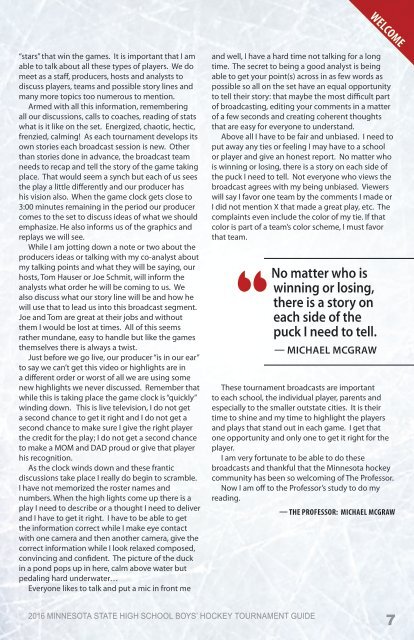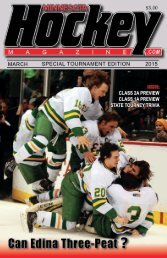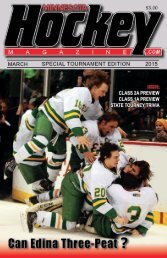2016 MN Hockey Mag Special Tournament Edition
Your complete guide to the 2016 Minnesota Class 1A and 2 A Boys' State High School Hockey Tournaments. Includes a Q&A with Minnesota hockey legend Lou Nanne, features by Michael McGraw, Dave Schwartz, Roger Godin and Heather Rule as well as tournament historical data and all-time records.
Your complete guide to the 2016 Minnesota Class 1A and 2 A Boys' State High School Hockey Tournaments. Includes a Q&A with Minnesota hockey legend Lou Nanne, features by Michael McGraw, Dave Schwartz, Roger Godin and Heather Rule as well as tournament historical data and all-time records.
Create successful ePaper yourself
Turn your PDF publications into a flip-book with our unique Google optimized e-Paper software.
Welcome<br />
“stars” that win the games. It is important that I am<br />
able to talk about all these types of players. We do<br />
meet as a staff, producers, hosts and analysts to<br />
discuss players, teams and possible story lines and<br />
many more topics too numerous to mention.<br />
Armed with all this information, remembering<br />
all our discussions, calls to coaches, reading of stats<br />
what is it like on the set. Energized, chaotic, hectic,<br />
frenzied, calming! As each tournament develops its<br />
own stories each broadcast session is new. Other<br />
than stories done in advance, the broadcast team<br />
needs to recap and tell the story of the game taking<br />
place. That would seem a synch but each of us sees<br />
the play a little differently and our producer has<br />
his vision also. When the game clock gets close to<br />
3:00 minutes remaining in the period our producer<br />
comes to the set to discuss ideas of what we should<br />
emphasize. He also informs us of the graphics and<br />
replays we will see.<br />
While I am jotting down a note or two about the<br />
producers ideas or talking with my co-analyst about<br />
my talking points and what they will be saying, our<br />
hosts, Tom Hauser or Joe Schmit, will inform the<br />
analysts what order he will be coming to us. We<br />
also discuss what our story line will be and how he<br />
will use that to lead us into this broadcast segment.<br />
Joe and Tom are great at their jobs and without<br />
them I would be lost at times. All of this seems<br />
rather mundane, easy to handle but like the games<br />
themselves there is always a twist.<br />
Just before we go live, our producer “is in our ear”<br />
to say we can’t get this video or highlights are in<br />
a different order or worst of all we are using some<br />
new highlights we never discussed. Remember that<br />
while this is taking place the game clock is “quickly”<br />
winding down. This is live television, I do not get<br />
a second chance to get it right and I do not get a<br />
second chance to make sure I give the right player<br />
the credit for the play; I do not get a second chance<br />
to make a MOM and DAD proud or give that player<br />
his recognition.<br />
As the clock winds down and these frantic<br />
discussions take place I really do begin to scramble.<br />
I have not memorized the roster names and<br />
numbers. When the high lights come up there is a<br />
play I need to describe or a thought I need to deliver<br />
and I have to get it right. I have to be able to get<br />
the information correct while I make eye contact<br />
with one camera and then another camera, give the<br />
correct information while I look relaxed composed,<br />
convincing and confident. The picture of the duck<br />
in a pond pops up in here, calm above water but<br />
pedaling hard underwater…<br />
Everyone likes to talk and put a mic in front me<br />
and well, I have a hard time not talking for a long<br />
time. The secret to being a good analyst is being<br />
able to get your point(s) across in as few words as<br />
possible so all on the set have an equal opportunity<br />
to tell their story: that maybe the most difficult part<br />
of broadcasting, editing your comments in a matter<br />
of a few seconds and creating coherent thoughts<br />
that are easy for everyone to understand.<br />
Above all I have to be fair and unbiased. I need to<br />
put away any ties or feeling I may have to a school<br />
or player and give an honest report. No matter who<br />
is winning or losing, there is a story on each side of<br />
the puck I need to tell. Not everyone who views the<br />
broadcast agrees with my being unbiased. Viewers<br />
will say I favor one team by the comments I made or<br />
I did not mention X that made a great play, etc. The<br />
complaints even include the color of my tie. If that<br />
color is part of a team’s color scheme, I must favor<br />
that team.<br />
“No matter who is<br />
winning or losing,<br />
there is a story on<br />
each side of the<br />
puck I need to tell.<br />
— MICHAEL MCGRAW<br />
These tournament broadcasts are important<br />
to each school, the individual player, parents and<br />
especially to the smaller outstate cities. It is their<br />
time to shine and my time to highlight the players<br />
and plays that stand out in each game. I get that<br />
one opportunity and only one to get it right for the<br />
player.<br />
I am very fortunate to be able to do these<br />
broadcasts and thankful that the Minnesota hockey<br />
community has been so welcoming of The Professor.<br />
Now I am off to the Professor’s study to do my<br />
reading.<br />
— THE PROFESSOR: MICHAEL MCGRAW<br />
<strong>2016</strong> MINNESOTA STATE HIGH SCHOOL BOYS’ HOCKEY TOURNAMENT GUIDE<br />
7





